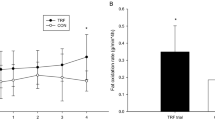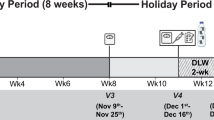Abstract
AIM: Humans appear to defend against energy deficit to a greater extent than energy surplus. Severe dietary energy restriction resulting in 5–30% weight loss often leads to hyperphagia and weight regain in lean subjects. However, the period of time over which fasting is often endured in Western society are far shorter, ∼1–2 days. This study examined how a 36 h fast effected the subsequent day's energy and nutrient intake in a group of 24 healthy, lean men and women.
METHOD: Subjects underwent two 2 day treatments, termed ‘fast’ and ‘maintenance’. During the ‘fast’ treatment, subjects were fed a maintenance diet on the day prior to the fast (day −1) to prevent overeating. They then consumed non-energy drinks only, from 20:00 h on day −1 to 08:00 h on day 2 (ad libitum feeding day), thus fasting for 36 h. On the ‘maintenance’ protocol, subjects received a maintenance diet throughout day 1. Throughout day 2 they had ad libitum access to a range of familiar foods, which were the same for both treatments. Body weight, blood glucose and respiratory quotient were used as compliance checks. Hunger was monitored on day's −1, 1 and 2 for the fast treatment only.
RESULTS: On day 2, average energy intake was 10.2 vs 12.2 MJ/day (s.e.d. 1.0) on the post-maintenance and post-fast periods, respectively (P=0.049). Subjects altered feeding behaviour, in response to the fast, only at breakfast time, selecting a higher-fat meal (P<0.005). Compared to day −1, motivation to eat was elevated during the fast (P<0.05). This continued until breakfast was consumed during the re-feeding period (day 2), when values then returned to baseline.
CONCLUSION: These data suggest that a 36 h fast, which generated a negative energy balance of ∼12 MJ, did not induce a powerful, unconditioned stimulus to compensate on the subsequent day.
This is a preview of subscription content, access via your institution
Access options
Subscribe to this journal
Receive 12 print issues and online access
$259.00 per year
only $21.58 per issue
Buy this article
- Purchase on Springer Link
- Instant access to full article PDF
Prices may be subject to local taxes which are calculated during checkout


Similar content being viewed by others
References
Mela DJ, Rogers PJ . Food, eating and obesity In The psychological basis of appetite and weight control Chapman & Hall: London 1998
Benedict FG, Miles WR, Roth P, Smith HM . Human vitality and efficiency under prolonged restricted diet Publication no. 701 Carnegie Institute of Washington: Washington, DC 1919
Keys A, Brozek J, Henschel A, Mickelsen O, Taylor HL . The biology of human starvation The University of Minnesota Press, North Central Publishing: Minneapolis, MN 1950
Gibney ER . The physical, psychological and metabolic effects of nutritional depletion and subsequent repletion PhD Thesis, Darwin College, University of Cambridge 2001
French SA, Jeffery RW, Murray D . Is dieting good for you? Prevalence, duration and associated weight and behaviour changes for specific weight loss strategies over four years in US adults Int J Obes Relat Metab Disord 1999 23: 320–327.
van Strien T, Frijters JER, Bergers GPA, Defares PB . The Dutch eating behaviour questionnaire (DEBQ) for assessment of restrained, emotional and external eating behaviour Int J Eating Disord 1986 5: 295–315.
Elia M, Livesey G . Theory and validity of indirect calorimetry during net lipid synthesis Am J Clin Nutr 1988 47: 591–607.
Stubbs RJ, O'Reilly LM, Johnstone AM, Franklin MF, Reid C . Description and evaluation of an experimental model to examine changes in qualitative and quantitative feeding behaviour in humans Eur J Clin Nutr 1999 53: 13–21.
Johnstone AM, Stubbs RJ, Harbron CG . Effect of overfeeding macronutrients on day-to-day food intake in man Eur J Clin Nutr 1996 50: 418–430.
Holland B, Welch AA, Unwin ID, Buss DH, Paul AA, Southgate DAT . McCance and Widdowson's The Composition of Foods The Royal Society of Chemistry: Cambridge 1991
Merime TJ, Tyson JE . Hypoglycemia in man pathologic and physiologic variants Diabetes 1977 26 (3): 161–165.
Elia M, Wood S, Khan K, Pullicino E . Ketone body metabolism in lean male adults during short-term starvation, with particular reference to forearm muscle metabolism Clin Sci 1990 78: 579–584.
Zauner C, Schneeweiss B, Kranz A, Madl A, Ratheiser K, Kramer L, Roth E, Schneider B, Lenz K . Resting energy expenditure in short-term starvation is increased as a result of an increase in serum norepinephrine Am J Clin Nutr 2000 71: 1511–1515.
Black AE, Coward WA, Cole TJ, Prentice AM . Human energy expenditure in affluent societies: an analysis of 574 doubly-labelled water measurements Eur J Clin Nutr 1996 50: 72–92.
Johnstone AM . Weight loss in human obesity PhD Thesis, University of Aberdeen 2001
Oh S-Y, Kim BS, Choue R . Appetite sensations and eating behaviours to complete fasting in obese and non-obese individuals Eur J Clin Nutr 2001 56: 86–89.
Bollinger RE, Lukert BD, Brown RV, Guevara RW, Stenberg R . Metabolic balance of obese during fasting Arch Intern Med 1966 118: 3–8.
Lappalainen R, Sjoden PO, Hursti T, Vesa V . Hunger/craving responses and reactivity to food stimuli during fasting and dieting Int J Obes 1990 14: 679–688.
Lawton CL, Burley VJ, Wales JK, Blundell JE . Dietary fat and appetite control in obese subjects: weak effects on satiation and satiety Int J Obes 1993 17: 409–416.
Green SM, Burley VJ, Blundell JE . Effect of fat- and sucrose-containing foods on the size of eating episodes and energy intake in lean males: potential for causing overconsumption Eur J Clin Nutr 1994 48: 547–555.
Delargy HD, Burley VJ, Sullivan KR, Fletcher RJ, Blundell JE . Effects of different soluble:insoluble fibre ratios at breakfast on 24-h pattern of dietary intake and satiety Eur J Clin Nutr 1995 49: 754–766.
Caputo FA, Mattes RD . Human dietary responses to covert manipulations of energy, fat and carbohydrate in a midday meal Am J Clin Nutr 1992 56: 36–43.
Foltin RW, Rolls BJ, Moran TH, Kelly TH, McNelis AL, Fischman MW . Caloric, but not macronutrient compensation by humans for required eating occasions for meals and snacks varying in fat and carbohydrate Am J Clin Nutr 1992 55: 331–342.
Goldberg GR, Murgatroyd PR, McKenna AP, Heavey PM, Prentice AM . Dietary compensation in response to covert imposition of negative energy balance by removal of fat or carbohydrate Br J Nutr 1998 80 (2): 141–147.
Acknowledgements
This work was supported by Slimming World, Alfreton, UK and SEERAD (Scottish Executive Environment and Rural Affairs Department).
Author information
Authors and Affiliations
Corresponding author
Additional information
Part of this work was presented as an abstract at the Nutrition Society Summer Symposium, University of Glasgow, Glasgow, July 1999.
Rights and permissions
About this article
Cite this article
Johnstone, A., Faber, P., Gibney, E. et al. Effect of an acute fast on energy compensation and feeding behaviour in lean men and women. Int J Obes 26, 1623–1628 (2002). https://doi.org/10.1038/sj.ijo.0802151
Received:
Revised:
Accepted:
Published:
Issue Date:
DOI: https://doi.org/10.1038/sj.ijo.0802151
Keywords
This article is cited by
-
Hemp and buckwheat are valuable sources of dietary amino acids, beneficially modulating gastrointestinal hormones and promoting satiety in healthy volunteers
European Journal of Nutrition (2022)
-
No effect of 24 h severe energy restriction on appetite regulation and ad libitum energy intake in overweight and obese males
International Journal of Obesity (2016)
-
Fasting for weight loss: an effective strategy or latest dieting trend?
International Journal of Obesity (2015)
-
The effects of intermittent or continuous energy restriction on weight loss and metabolic disease risk markers: a randomized trial in young overweight women
International Journal of Obesity (2011)
-
The transcriptomic signature of fasting murine liver
BMC Genomics (2008)



